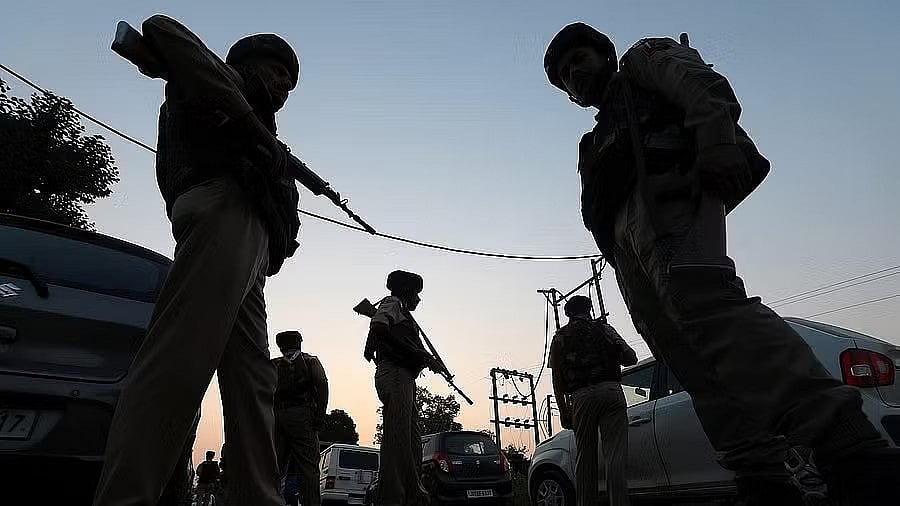
Representative image showing Jammu & Kashmir Police personnel.
Credit: PTI Photo
Srinagar: The Counter-Intelligence (CI) wing of the Jammu and Kashmir Police on Saturday carried out simultaneous raids at 10 locations across four districts of the Kashmir Valley.
The operation is part of an ongoing investigation into a terror-funding and recruitment module allegedly run by Pakistan-based Jaish-e-Mohammed (JeM) commander Abdullah Ghazi, officials said.
The coordinated searches were conducted at six locations in central Kashmir’s Ganderbal district, two in Budgam, one in Pulwama, and one in Srinagar, they said. The operation is linked to a broader investigation targeting JeM sleeper cells and recruitment modules receiving cross-border support, particularly through cryptocurrency-based terror financing channels.
“These searches were aimed at securing critical evidence regarding a broader conspiracy involving cross-border terror funding and the recruitment of vulnerable local youth,” a senior police official said. “The network is suspected to be operating at the behest of Abdullah Ghazi, a JeM commander currently based across the Line of Control,” he added.
The crackdown comes just over a week after the State Investigation Agency (SIA), Kashmir, conducted similar raids at suspected terror-financing locations in Jammu, Doda, and Handwara. The SIA’s earlier raids also focused on the use of cryptocurrency to fund terrorism and foment unrest in the region.
According to officials, Saturday’s raids were conducted under the ambit of an FIR registered at the CI-SIA Police Station in Kashmir. The case invokes serious charges under the Unlawful Activities (Prevention) Act, including Sections 18 (conspiracy to commit terrorist act), 38 and 39 (membership and support to a terrorist organization), along with Sections 120B (criminal conspiracy), 121 (waging war against the nation), and 121A (conspiracy to wage war) of the Indian Penal Code.
Sources said the investigations are aimed not just at financial channels but also at identifying overground workers (OGWs) and individuals allegedly inciting youth into anti-national activities. Several mobile phones, electronic devices, and documents are reported to have been seized during the raids and are being sent for forensic examination.
The police official described the operation as part of an evolving strategy to dismantle terror infrastructure from within. “The priority is to disrupt networks that quietly feed into terror groups’ long-term goals — be it through money, manpower, or propaganda,” he said.
No immediate arrests have been confirmed, but officials said the identities of several suspects are under scrutiny and further leads are being pursued.
This latest string of raids signals an intensifying effort by security agencies to neutralize not only active militants but also the shadowy ecosystem that enables their survival and expansion.